|
|
|
Sort Order |
|
|
|
Items / Page
|
|
|
|
|
|
|
| Srl | Item |
| 1 |
ID:
142540
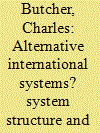

|
|
|
|
|
| Summary/Abstract |
Were precolonial state systems different to the European model? If so, how did these state systems vary, and do variations in system structure influence the frequency of war? In this article we assess the structure off international systems in nineteenth-century West Africa, Southeast Asia, and South Asia using new data on precolonial states that corrects for some of the biases in the existing Correlates of War state system membership data. We develop a framework to capture variation in political order above and below the state, and explore the similarities and differences between these systems and the European system we know and study. We then assess how rates of inter- and intra-state war varied across these systems. Our results suggest: (1) It is the nature of hierarchy (not so much anarchy) that varies across these systems; and (2) inter-state wars are more frequent, but less intense, in systems composed of decentralised states.
|
|
|
|
|
|
|
|
|
|
|
|
|
|
|
|
| 2 |
ID:
056744
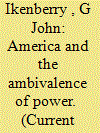

|
|
|
| 3 |
ID:
088562
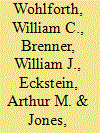

|
|
|
|
|
| Publication |
2009.
|
| Summary/Abstract |
In her response to our article, Mette Eilstrup-Sangiovanni replaces balance-of-power theory (threat of hegemony begets balancing, which produces a tendency of international systems toward equilibria of power) with a complex congeries of competing and contingent conjectures about when states might balance. While these are certainly part of the extensive literature on the balance of power, lumping them together and calling them a `theory' invites a comedy of errors rather than an empirical test. The `ado' in our article was a novel empirical test of a theory that has been central to centuries of IR theorizing. As our review of the evidence confirms, this theory can indeed be evaluated in ancient and non-European international systems, and it is wrong: international systems do not tend toward equilibria of power, and balancing is relatively unimportant in explaining the equilibria that do occur. We end up agreeing with the gist of Sangiovanni's response: there is no empirically valid systemic balance-of-power theory, and it is time to turn to contingent middle-range hypotheses about balancing
|
|
|
|
|
|
|
|
|
|
|
|
|
|
|
|
| 4 |
ID:
105925
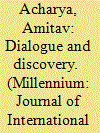

|
|
|
|
|
| Publication |
2011.
|
| Summary/Abstract |
Scholars of International Relations (IR) increasingly realise that their discipline, including its theories and methods, often neglects voices and experiences outside of the West. But how do we address this problem and move the discipline forward? While some question whether 'Western' and 'non-Western' (or 'post-Western') are useful labels, there are also other perspectives, including those who believe in the adequacy of existing theories and approaches, those who argue for particular national 'schools' of IR, and those who dismiss recent efforts to broaden IR theory as 'mimicry' in terms of their epistemological underpinnings. After reviewing these debates, this article identifies some avenues for further research with a view to bringing out the global heritage of IR. These include, among other things, paying greater attention to the genealogy of international systems, the diversity of regionalisms and regional worlds, the integration of area studies with IR, people-centric approaches to IR, security and development, and the agency role of non-Western ideas and actors in building global order. I also argue for broadening the epistemology of IR theory with the help of non-Western philosophies such as Buddhism. While the study of IR remains dominated by Western perspectives and contributions, it is possible to build different and alternative theories which originate from non-Western contexts and experiences.
|
|
|
|
|
|
|
|
|
|
|
|
|
|
|
|
| 5 |
ID:
076482
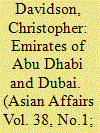

|
|
|
| 6 |
ID:
141844
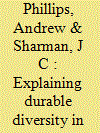

|
|
|
|
|
| Summary/Abstract |
International Relations theories generally hold that increased interaction between units in an international system produces convergence in their forms through military competition, institutional emulation, or normative socialization. In contrast, we argue that diverse international systems can endure despite increasing interaction. The early modern Indian Ocean international system hosted a variety of statist, corporate, and imperial polities. Diversity endured for three reasons. First, powerful foreign and local actors held differing maritime and land-oriented preferences for conquest, which created the potential for coexistence between unlike polities. Second, congruent European and Asian ideas of heteronomy facilitated durable polity diversity. Third, strategies of localization enhanced enmeshment. Convergence on common polity forms failed to occur despite the presence of a statist model during this period. Subsequently, a reconfigured form of diversity under colonial empires succeeded this order. Greater attention to past diverse systems coheres with recent calls to study history to better understand not only contemporary instances of international hierarchy, but also unbundled and shared sovereignty regimes.
|
|
|
|
|
|
|
|
|
|
|
|
|
|
|
|
| 7 |
ID:
124253


|
|
|
|
|
| Publication |
2013.
|
| Summary/Abstract |
Since the end of the cold war over two decades ago, the world has withnessed fundamental transformation at many lavels in the international system. These changes were revolutionary. "One could argue that six revolutions are dominating in what we called the long twenty first century. Starting in 1989, the revolution in international affairs, the revolution in economics affairs, the revolution in technological affairs, the revolution in societal affairs, the regulation revolution and finally the revolution in military affairs."
|
|
|
|
|
|
|
|
|
|
|
|
|
|
|
|
| 8 |
ID:
073834
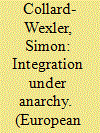

|
|
|
|
|
| Publication |
2006.
|
| Summary/Abstract |
The process of integration and the pacification of Western Europe can be seen as one of the most significant developments in international relations at the turn of the century. Yet the European Union (EU) remains under-theorized and neglected in the neorealist canon. This article explains the difficulty of neorealism at explaining the EU. At a historical level, the breadth and depth of European integration challenge neorealist predictions regarding sustained cooperation, relative gains, interdependence, international institutions, balance of power, and bandwagoning. At a systemic level, the EU manifests anomalous forms of mixed hierarchy and functional differentiation. Neorealist attempts to develop auxiliary theories to account for the anomalies created by the EU has created a degenerative research program that is either incomplete, logically flawed, or empirically false. This article concludes by pinpointing the failure of neorealism, proposing theoretical renovations, and drawing policy implications.
|
|
|
|
|
|
|
|
|
|
|
|
|
|
|
|
| 9 |
ID:
139797
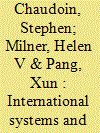

|
|
|
|
|
| Summary/Abstract |
Following older debates in international relations literature concerning the relative importance of domestic versus systemic factors, newer debates emphasize interdependence among states and the complex interactions between systemic and domestic factors. As globalization and democratization advance, theories and empirical models of international politics have become more complicated. We present a systematic theoretical categorization of relationships between domestic and systemic variables. We use this categorization so that scholars can match their theory to the appropriate empirical model and assess the degree to which systemic factors affect their arguments. We also present two advances at the frontier of these empirical models. In one, we combine hierarchical models of moderating relationships with spatial models of interdependence among units within a system. In the other, we provide a model for analyzing spatial interdependence that varies over time. This enables us to examine how the level of interdependence among units has evolved. We illustrate our categorization and new models by revisiting the recent international political economy (IPE) debate over the relationship between trade policy and regime type in developing countries.
|
|
|
|
|
|
|
|
|
|
|
|
|
|
|
|
| 10 |
ID:
061755
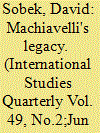

|
|
|
| 11 |
ID:
178491
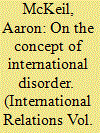

|
|
|
|
|
| Summary/Abstract |
International relations today are widely considered to be experiencing deepening disorder and the topic of international disorder is gaining increased attention. Yet, despite this recent interest in international disorder, in and beyond the academy, and despite the decades-long interest in international order, there is still little agreement on the concept of international disorder, which is often used imprecisely and with an alarmist rather than analytical usage. This is a problem if international disorder is to be understood in theory, towards addressing its concomitant problems and effects in practice. As such, this article identifies and explores two ways international order studies can benefit from a clearer and more precise conception of international disorder. First, it enables a more complete picture of how orderly international orders have been. Second, a greater understanding of the problem of international order is illuminated by a clearer grasp of the relation between order and disorder in world politics. The article advances these arguments in three steps. First, an analytical concept of international disorder is developed and proposed. Second, applying it to the modern history of international order, the extent to which there is a generative relationship between order and disorder in international systems is explored. Third, it specifies the deepening international disorder in international affairs today. It concludes by indicating a research agenda for International Relations and international order studies that takes the role of international disorder more seriously.
|
|
|
|
|
|
|
|
|
|
|
|
|
|
|
|
| 12 |
ID:
141486
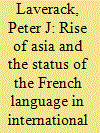

|
|
|
|
|
| Summary/Abstract |
In the last century, French and English became entrenched as the two working languages of international law. Since that time, we have witnessed the rapid development and integration of Asian nations into international systems and the adoption of English as the sole universal language in other fields. This article carries out a cost-benefit analysis concerning the continued use of French in international law, in particular at the tribunals of international criminal law. The aim of this article is to assess whether the current bilingual system is fit for purpose in the 21st century. The mode of analysis is data, first showing the global use of languages today, and then regarding the make-up and workings of international courts, in particular the International Criminal Court. From this data, the author concludes that French is unfit for purpose as a common working language due to the bias that its use creates against Asian and Latin American nations. The author concludes that the only satisfactory solution is the abandonment of French in favour of a system that uses English as the sole common working language.
|
|
|
|
|
|
|
|
|
|
|
|
|
|
|
|
| 13 |
ID:
076996
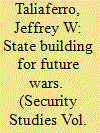

|
|
|
|
|
| Publication |
2006.
|
| Summary/Abstract |
Neorealist theory holds that the international system compels states to adopt similar adaptive strategies - namely, balancing and emulation - or risk elimination as independent entities. Yet states do not always emulate the successful practices of the system's leading states in a timely and uniform fashion. Explaining this requires a theory that integrates systemic-level and unit-level variables: a "resource-extraction" model of the state in neoclassical realism. External vulnerability provides incentives for states to emulate the practices of the system's leading states or to counter such practices through innovation. Neoclassical realism, however, suggests that state power - the relative ability of the state to extract and mobilize resources from domestic society - shapes the types of internal balancing strategies that countries are likely to pursue. State power, in turn, is a function of the institutions of the state, as well as of nationalism and ideology. The experiences of six rising or declining great powers over the past three hundred years - China, France, Great Britain, Japan, Prussia (later Germany), and the United States - illustrate the plausibility of these hypotheses
|
|
|
|
|
|
|
|
|
|
|
|
|
|
|
|
| 14 |
ID:
117201
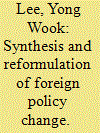

|
|
|
|
|
| Publication |
2012.
|
| Summary/Abstract |
What explains major foreign policy changes? Why and when does the state change its foreign policy? Despite the importance of foreign policy change, which can (re)shape the nature of a given state's international relations vis-à-vis other states and international systems, explanations of foreign policy change have received only sporadic attention in foreign policy analysis literature. Against this backdrop, I offer in this article a new framework designed to capture both motivational and processual aspects of foreign policy change. I develop the framework by critically examining and synthesising two recent systematic explorations of foreign policy change: one framework within the tradition of rationalism (broadly defined) - David Welch's Painful Choice: A Theory of Foreign Policy Change (2005) - and the other within constructivism - Jeffrey Legro's Rethinking the World: Great Power Strategies and International Order (2006). For the motivational analysis, I link the role of crisis-defining ideas to threat perception to sharpen prospect theory. I illustrate this reformulated synthesis with an example of Japan's policy shift toward East Asian financial regionalism.
|
|
|
|
|
|
|
|
|
|
|
|
|
|
|
|
| 15 |
ID:
160884
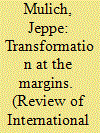

|
|
|
|
|
| Summary/Abstract |
Taking the phenomenon of empire as its starting point, this article seeks to provide a framework for addressing the question of how and why international systems change over time. Synthesising elements from network-relational analysis and practice theory, I argue that international systems are best thought of as being composed of multiple partially overlapping and interrelated hierarchical networks. These networks are made up of social ties – as in classic network analysis – but also of specific repertoires of practice. Systemic transformations happen through the reconfiguration of networks, both through shifts in social ties and through changes in their practices. Empire provides a particularly illuminating window into the topic of systemic change, in part because a major driver of historical transformations has been the expansion of empires and their encounters with other heterogeneous polities across the globe, and in part because a focus on imperial interactions highlights the limitations of existing unit-centric perspectives. Drawing on examples from the nineteenth century, I illustrate the usefulness of the framework by showing how different regionally anchored systems came into contact with the expanding spheres of Western empires and how such points of interaction contributed to the development of an increasingly global international system.
|
|
|
|
|
|
|
|
|
|
|
|
|
|
|
|
| 16 |
ID:
092040
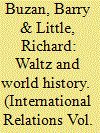

|
|
|
|
|
| Publication |
2009.
|
| Summary/Abstract |
This article provides a critique of Waltz's work from the perspective of world history. It shows how Waltz's commitment to a highly parsimonious theoretical approach paradoxically both sets up the possibility of his theory being universally applicable, and undermines its prospects as a viable approach to understanding world history. Using the key concepts from Waltz's work - units, systems, structure, process - we show the detailed grounds on which his theory fails to apply to such large swathes of time and place, so that its claims to universality fall, even though it can usefully be applied to some times and places. We also show its shortcomings in relation to the essential historical task of periodization. We argue that international relations needs to engage more with world history, and that the task of doing so will fall to approaches other than Waltz's.
|
|
|
|
|
|
|
|
|
|
|
|
|
|
|
|
|
|
|
|
|